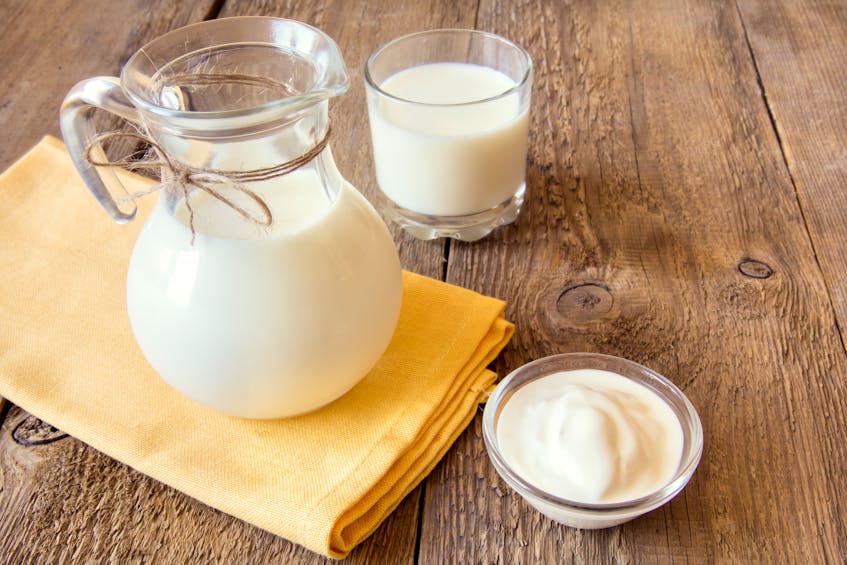Like cheese and ice cream? The British Medical Journal has some good news for you.
In an article published last year, the magazine detailed the results of an international study, which found eating at least two daily servings of dairy lowers your risk of diabetes and high blood pressure.
The research, which included participants from 21 countries in the 35-70 age category, said the benefits were greatest for full-fat dairy products like cheese, homogenized milk, and ice cream (especially the kind made with real cream).
Those results came as little surprise to Isabelle Neiderer, the chief nutritionist for Dairy Farmers of Canada. In fact, it's very much in line with the 21 other reviews and papers she has seen over the last 15 years.
Most of those studies focused on North America or Europe, but the Prospective Urban Rural Epidemiology (PURE) study that was the focus of British Medical Journal article include a mixture of what could be considered developed countries (including Canada) as well as countries from the developing world like Bangladesh and Zimbabwe.
The wide-ranging study measured not only dairy intake but personal medical history, use of prescription medicines, educational attainment, smoking, and measurements of weight, height, waist circumference, blood pressure, and fasting blood glucose were also collected.
Neiderer said the latter measurements form part of the metabolic syndrome - the cluster of factors that lead to greater risk of cardiovascular disease.
The study, conducted over a nine-year period, showed participants who ate two dairy servings a day had a 24 per cent lower risk of metabolic syndrome, rising to 28 per cent for full-fat dairy alone, compared with no daily dairy intake. The same two servings also lowered the risk of both high blood pressure and diabetes by 11 to 12 per cent. Those odds rose to 13-14 per cent with three dairy servings a day.

Milk in moderation
Both Neiderer and Jamie MacPhail, who is the corporate secretary and communications manager for Amalgamated Dairies Limited (ADL) in PEI, caution against going out and eating a block of cheese or a tub of ice cream in the hopes of getting healthier.
"The key is moderation with dairy products as part of a balanced diet," said MacPhail, whose company produces 25 different cheeses along with butter and ice cream as well as evaporated, condensed, and fluid milk.
"We also advocate a balanced lifestyle, including exercise."
MacPhail explained ADL is owned by the 165 dairy producers in PEI and is one of the few operations in Canada that manages the milk from the farm gate to the grocery store.
"I would definitely agree moderation and balance are the key words," Neiderer noted. "A healthy lifestyle that includes exercise and eating right is what we advocate."
Calcium crisis
Neiderer said there is another compelling reason for Atlantic Canadians to make sure they include dairy products in their diet: what she calls the country's calcium crisis.
She points to a study by Statistics Canada and Health Canada, which showed a dramatic decrease in calcium intake from both food and sources like vitamins and calcium supplements between 2004 and 2015.
Calcium, the most abundant mineral in the body, is essential for healthy bones and teeth. A deficiency, especially in aging adults, can lead to osteoporosis.
That study showed the calcium coming from milk went down by 7.5 per cent in people taking calcium supplements and 6.1 per cent for those relying entirely on their diet to get enough calcium.
Neiderer called the results both "dramatic" and "frightening," noting the calcium inadequacy for people not taking supplements was pegged at 68 per cent in 2015 - a 10 per cent increase over the life of the study. Even those taking supplements have a 31 per cent calcium inadequacy.
Both MacPhail and Neiderer pointed out there are a number of misconceptions about dairy products - one of the most common being they are not included in the most recent edition of the Canada Food Guide.
"That is simply not true," Neiderer said, pointing out that milk and milk products are suggested as part of the protein servings in the guide.
MacPhail agreed, saying, it's all about balance.
"Too much of any food is not likely to be good for you."
MacPhail said studies like the one described in the British Medical Journal should make everyone involved in the dairy industry stand a little taller.
"Our producer owners should be extremely proud of the fact they are producing safe healthy food for Canadians," he added.
Learn more about the British Medical Journal study
Learn more about the Statistics Canada and Health Canada report









